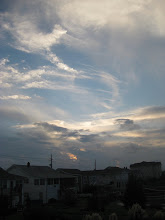And in America, we live in this age of milk and honey. Depending on where you live, you can usually drive less than a mile or two to a supermarket. Inside each brightly lit supermarket are rows and rows of foods, sorted by category, most often in colorful boxes or bottles, shouting for attention. Then sorted by different brands of food (the same food-thing but in different packaging) and some food even sorted by caloric value. You will find various whimsical flavors, fake food, enhanced produce, and a frozen food aisle: once dubbed with a sigh as the loneliest grocery aisle by a past classmate of mine.
So would you like soy milk, lactose free milk, goat's milk, government milk, or chocolate milk? Or do you care for organic honey, store brand economical honey, honey ham, or honey in little bear shaped bottles? Anything you want.
But there is a catch you know, there's always a catch. You must hand over money to the clerk at the front of the store. And you have to work for money, and some people can't do that. Oh, there are many reasons, some their fault and some not. Some have jobs but get paid very little and have other things to pay for too. Some of us have had luckier breaks than others, and some of us were never given a chance.
The food waits for people to come free it from the shelves. The supermarkets put out more than they need to so the shelves look nice and pretty and full. So much of the time, food rots away on the shelves, and must be thrown out. Sometimes they'll lower the price before this happens, but not always.
So we have an abundance of milk and honey and pretty much, whatever else we could desire, so close, a few dollars away. We can look at it, and most of us can pick it up whenever we want, take it home with us and have a really nice garnish to breakfast. But what's left we just toss, we can't just give it away.
But will this period of excessive choice be always? Why is this so normal for us when there are people so hungry all over the world, and even in our own country? We scheme other countries out of produce, out of fisheries, out of resources, so our shelves can be full. Now people are finding it harder to hand the money to the clerk waiting at the front of the store, we are finding we are something called a recession, which has everyone in America in a tizzy. At least our government will throw you a borrowed dime, you may not get any honey but you can get some bread.
One of the worst experiences a person can have is to be truly hungry. Oh, I do not know this from personal experience. I have never known hunger that was forced upon me; if I was hungry it was because I had chosen not to eat. But I do have it from second-hand knowledge. My grandfather was a POW in World War II in the Phillipines and Japan. One of the last living people that has experienced the Bataan Death March and the mistreatment in the following camps. He grew to know hunger intimately- it's smell, the anullment of taste except for the memory, it's lingering breath. But what makes him so amazing is his positivity, for every sad story from that time there is a lively one, and usually interesting. I call him SuperFred, and never has a nickname suited someone better. Our lives are so entwined it is hard not to speak of him, so you will get to know SuperFred through me. His story is truly more amazing than Forrest Gump's. For serious.
As we've covered some of my ancestry, a dash of consumerism, and a pinch of world hunger-- I believe that is enough for this entry. Come back anytime.
In Rubrics and In Rainbows,
Spinsley
"I had once believed that we were all masters of our fate- that we could mould our lives into any form we pleased . . . I had overcome deafness and blindness sufficiently to be happy, and I supposed that anyone could come out victorious if he threw himself valiantly into life's struggle. But as I went more and more about the country I learned that I had spoken with assurance on a subject I knew little about . . . I learned that the power to rise in the world is not in the reach of everyone." -Helen Keller

No comments:
Post a Comment